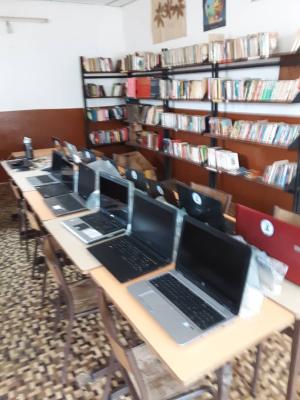Computer Courses & Cine-debat
Breakdown:
- Accommodation and food: 90.00 Euro
- Transportation: 25.00 Euro
- Activities: 45.00 Euro
- Hosting organisation support: 60 Euro

Description: Access to computers is still very limited in Togo's universities, senior high schools and secondary schools. The vast majority of Togolese pupils and students do not master the use of IT tools. This puts them at a disadvantage during their school or university career. Aware of this, ASTOVOT is setting up simple, practical introductory courses to computers and the Internet for pupils. This project is open to any volunteer with a basic knowledge of computers who would like to pass this on to Togolese teenagers and young people. This programme is coupled with film-debate sessions in the afternoons to enable the volunteers and learners to discuss subjects linked to interculturality and the development of young people.
Type of Work: OBJECTIVES ? To give registered learners the tools they need to understand and master IT in a basic and accelerated way; To enable students to use IT to support their studies and to become aware of the risks and benefits of new technologies Organise film discussion sessions in the afternoons with the learners; TASKS TO BE CARRIED OUT BY VOLUNTEERS : Show the learners : Master the basic concepts of computing and computers; Be familiar with the computer environment (hardware and software); know the basic concepts of information systems and be aware of the security aspects of these systems; be familiar with the fundamentals of the Internet, understand its basic concepts and be able to use it for documentary and other research; and the responsible use of social networks
Accommodation: Accommodation is generally basic, simple and specific to the project location. On site, volunteers are accommodated in groups of three or four people per room. The number of people per room depends on how the volunteers themselves organise the group. In some places, volunteers can use dry toilets and showers without water inside. This means that volunteers will have to fetch water from a fountain or well. The association provides volunteers with plastic or foam mats. Volunteers who have sleeping bags can bring them with them if possible. Access to drinking water on site.
Language: The languages of the project are French and then English. However, we recommend that volunteers who are not French-speaking have a basic knowledge of French before they arrive, as the official language of Togo is French. The vast majority of local volunteers and local communities have a very poor level of English.
Requirements: This project requires specific qualities from volunteers: motivation, patience, team spirit, solidarity, sharing and listening,
Approximate Location: Kpalimé is about an hour and a half's drive from Lomé and is set in a beautiful natural environment. Located in south-west Togo, the area surrounding the town is lush and fertile, encircled by thickly wooded hills, deep valleys and small farming villages. Kpalimé is also the country's most important craft centre, home to a large number of artists and craftsmen: woodcarvers, batikeur, potters, weavers, calabash-makers, etc. The many "nature" walks and hikes take you along the paths to discover the daily life of the local people, who live mainly from agriculture.
Notes: During the work camp, the volunteers will cook their own meals. An internal organisation will create groups that will alternate to carry out the various domestic tasks domestic tasks, including cooking. The food products used for cooking are imported, local and organic. The diet of each volunteer will be taken into taken into account when preparing meals. Volunteers will have access to tropical fruit such as bananas, oranges, pineapples, mangoes, avocados, papayas, etc. Along side the main activities of the work camp, other activities are organised, such as discovery walks, hikes, festive outings and cultural encounters. These activities enable the volunteers to come into contact with the local population and to discover Togolese culture.
